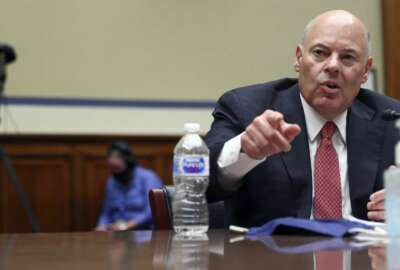To listen to the Federal Newscast on your phone or mobile device, subscribe in PodcastOne or Apple Podcasts. The best listening experience on desktop can be found using Chrome, Firefox or Safari.
- Media clamor has prompted the Office of Special Counsel (OSC) to issue special guidance on the Hatch Act. As the Republican convention winds up, the OSC says it has been hit with a slew of media inquiries about the prohibition on politicking by federal employees. Special Counsel Henry Kerner, in a statement, said the Hatch Act expressly does not apply to the President or Vice President and that only the Justice Department can advise on criminal provisions from the Hatch Act. He adds the Rose Garden and West Lawn of the White House are Hatch Act-free zones, so feds attending events there are not necessarily violators.
- Another record year for the cloud security program known as FedRAMP. The number of cloud services and the amount of times they are being reused across the government continues to rise over the past year. The Federal Risk Authorization and Management Program or FedRAMP authorized more than 60 new cloud services in fiscal 2020. This is up from 45 last year. Additionally, FedRAMP Director Ashley Mahan says reciprocity is growing at an even higher rate. Agencies have reused the security documents for the more than 200 cloud services 1,850 times this year. This is more than double the 890 examples of reuse last year.
- Federal agencies have had some success in hiring more veterans in recent years. Retaining them is a different story. The Government Accountability Office (GAO) looked at employment data from 2014 to 2018, and found almost 19% of veterans quit their federal civilian jobs within their first five years. That’s compared to an 11% attrition rate for non-veterans. GAO says the Office of Personnel Management needs to help agencies understand the reasons veterans leave the civil service, including by harnessing data from the Federal Employee Viewpoint Survey.
- The Postal Service has yet to turn a corner on its financial losses. The agency is reporting a $1 billion net loss for July, more than a 40% greater loss than what it reported for the same period last year. The agency saw first-class mail volume decrease by nearly 5% and marketing mail dropped by more than 20%. The volume of packages, however, is up more than 50%.
- Between the pandemic and the rising amount of technical debt, one industry association says it is time agencies face the hard truth: Current acquisition and funding approaches are failing to bring innovation into the government fast enough. The Alliance for Digital Innovation is releasing a new white paper laying out six potential solutions to these long-standing challenges. Among the ideas ADI is putting forward is the expansion of the other transaction authority capability to all agencies and the broader use of an “as-a-service” model to keep agencies closer to the cutting edge.
- The pandemic is changing the way the Trump administration is thinking about employee reskilling programs. The Office of Management and Budget (OMB) originally wanted to offer both online and in-person data science training to a group of 60 federal employees for an upcoming reskilling pilot. But the entire pilot is virtual now. OMB says employees will form into teams and will work with their agency’s data sets on a capstone project. The nomination and application process is over for the first data science cohort. But OMB says it is planning to host more after the first pilot is over. (Federal News Network)
- The first tranche of assessors under the Cybersecurity Maturity Model Certification or CMMC program, will begin training on Aug. 31. The CMMC accreditation body named 73 provisional assessor candidates, 82% of whom were selected randomly from a pool of more than 500 applicants. The provisional assessors will take a four-day training course and have to pass an exam to begin assessing vendors in how they meet the standards. The assessors will provide feedback and retrospective information to the AB, following each assessment, as a way to improve the initial phase of the program.
- At a time when the Postal Service is cutting costs, its inspector general says overtime costs are increasing year after year. Between fiscal 2014 and 2019, the agency saw a 35% growth in overtime hours and paid out more than $25 billion in overtime in those years. The IG says overtime accounts for 13% to 16% of all the agency’s labor spending. Postmaster General Louis DeJoy told the House Oversight and Reform Committee that the Postal Service has spent $700 million in overtime since he arrived in June.
- The body of a missing Fort Hood soldier is believed to have been found Tuesday, about 30 miles from the Texas Army base. An ID found with the body led local police to believe it is Sgt. Elder Fernandes, who was reported missing on Aug. 19. Fernandes is the third soldier from Fort Hood to go missing in the past year, and the previous two service members were both found dead this summer. Police say foul play is not suspected in the latest death but the investigation is ongoing. Fort Hood has some of the highest rates of sexual assault, harassment and murder in the Army. (Federal News Network)
- Leaders working to reform the Defense Department’s digital learning system call for common language across the community. The Enterprise Digital Learning Modernization Executive Steering Committee convened online Wednesday. Members pushed for greater interoperability and shared taxonomies across military, civilian and intelligence agencies. They said DoD needs to recognize the total force picture, as civilians and the military now work side by side on the battlefield.
Copyright
© 2025 Federal News Network. All rights reserved. This website is not intended for users located within the European Economic Area.





